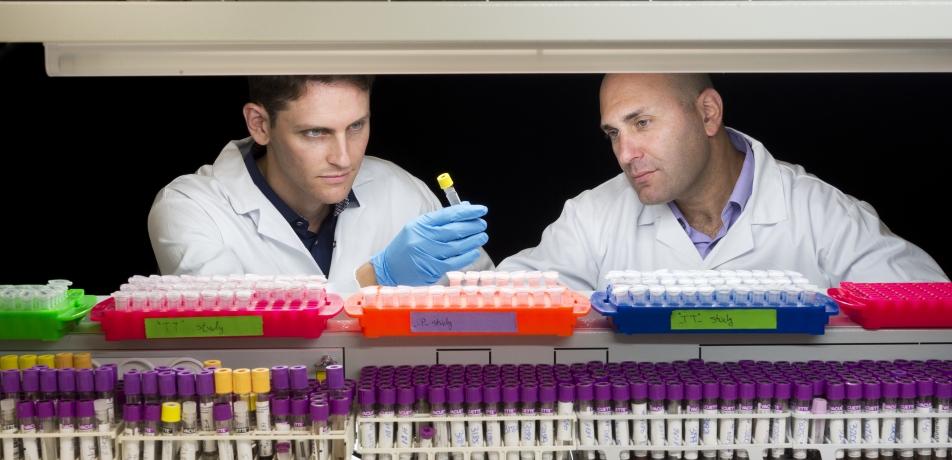Viral or bacterial?
Device identifies infection type, streamlining antibiotic prescription
Alumni

(L-R) MeMed co-founders Dr. Eran Eden and Dr. Kfir Oved (Credit: MeMed)
As bleary-eyed parents press their doctors for quick remedies to sooth their feverish toddlers, pediatricians face an all-too-common conundrum: whether the ear pain, sore throats, dripping noses, and the phlegmy coughs are of viral or bacterial origin. The determination is left to the doctor’s experience; if bacterial, then antibiotics are prescribed, and if viral, the patient is told to rest, drink lots of fluids—and wait it out.
Now, a Weizmann Institute alumnus has devised a sophisticated device that takes the educated guesswork out of the physicians’ hands and into the realm of hard science.
Dr. Eran Eden, a 2010 graduate and the co-founder and CEO of Haifa-based MeMed, says he and his partner, Dr. Kfir Oved, “imagined a small device that, using a drop of blood, would tell a physician whether it’s a bacterial or viral infection, which would determine whether to treat it with antibiotics.”
Rather than trying to detect the bacteria or the virus, the duo decided to rely on what Dr. Eden calls “the best available detection system—much better than we could ever hope to develop as scientists and clinicians: the body’s own immune system.” With just a small volume of a patient’s blood, MeMed’s technology is able to screen for a signature set of three immune proteins—TRAIL, CRP, and IP-10—that can accurately indicate the presence of viral or bacterial infections in just 15 minutes. While other solutions do already provide doctors with critical information about illness origin, tests such as swab cultures require at least 24 hours for sufficient bacterial growth. Existing rapid exams, meanwhile, are only applicable to infections that are readily accessible, excluding illnesses like ear infections or pneumonia. Some offer many false negatives or positives.
The status quo has led to a situation in which doctors are, paradoxically, both over-prescribing and under-prescribing antibiotics. Approximately one out of every two-to-three patients is receiving antibiotics unnecessarily, wasting billions of dollars annually and resulting in a surge of antibiotic-resistant bacterial strains, Dr. Eden says. On the other hand, he adds, about one in five patients with a bacterial infection goes home without antibiotics.
Determined to provide a convenient solution to this universal problem, Dr. Eden and MeMed co-founder Dr. Oved—a Technion graduate who serves as the company’s Chief Technology Officer—teamed up to develop a device that could identify infections as viral or bacterial at the point of care.
“Very early on, we understood this was a daunting task—it’s like trying to climb Mount Everest,” Dr. Eden says. “We had to stop in base camp and get some supplies. Base camp is our first-generation product, ImmunoXpert.”
Select medical centers in Israel are already utilizing ImmunoXpert, which requires two hours to screen samples for the three signature proteins. Cleared for use in Israel, the European Union, and Switzerland, ImmunoXpert has undergone numerous successful clinical trials with more than 10,000 patients. The scientists described its efficacy in several top medical journals including The Lancet Infectious Diseases and Pediatrics. Yet this relatively cumbersome apparatus not only involves a two-hour wait time, but also requires a lab technician to administer the tests.
Once the MeMed team established that they had, in fact, identified the optimal trio of immune proteins and saw that ImmunoXpert provided accurate results, they began developing the forthcoming ImmunoPoC, a small benchtop device that generates accurate readings in just 15 minutes, using the same fundamental technology. In early 2017, the company received $9.2 million from the U.S. Department of Defense’s Defense Threat Reduction Agency, and $5 million from the European Commission to help support the development of the new platform.
MeMed is readying ImmunoPoC for a soft launch in Israel and Europe toward the second half of next year. In the soft launch, the device will initially be commercialized in a limited number of medical centers as part of an early-access program, prior to a widespread global launch. A doctor, a nurse, or even a non-professional can administer ImmunoPoC at the point of care.
Dr. Eden, who completed his PhD in the Department of Molecular Cell Biology, remains involved in the Weizmann Institute as an active participant in WeizmannVibe, the young scientific club of the Israeli Friends Association, and the Weizmann Institute Entrepreneurship Program (WISe), an extracurricular program for students and alumni interested in learning about Israel’s start-up world. In large part, he attributes his creative mindset to the skills he gained in Prof. Uri Alon’s laboratory, where he learned to navigate through foggy, uncertain research questions that Prof. Alon dubbed as “the cloud.”
“If you want to go for something big—go from known to unknown—you’re bound to step in the cloud,” Dr. Eden says. “Have the patience and perseverance to try to find the way out.”